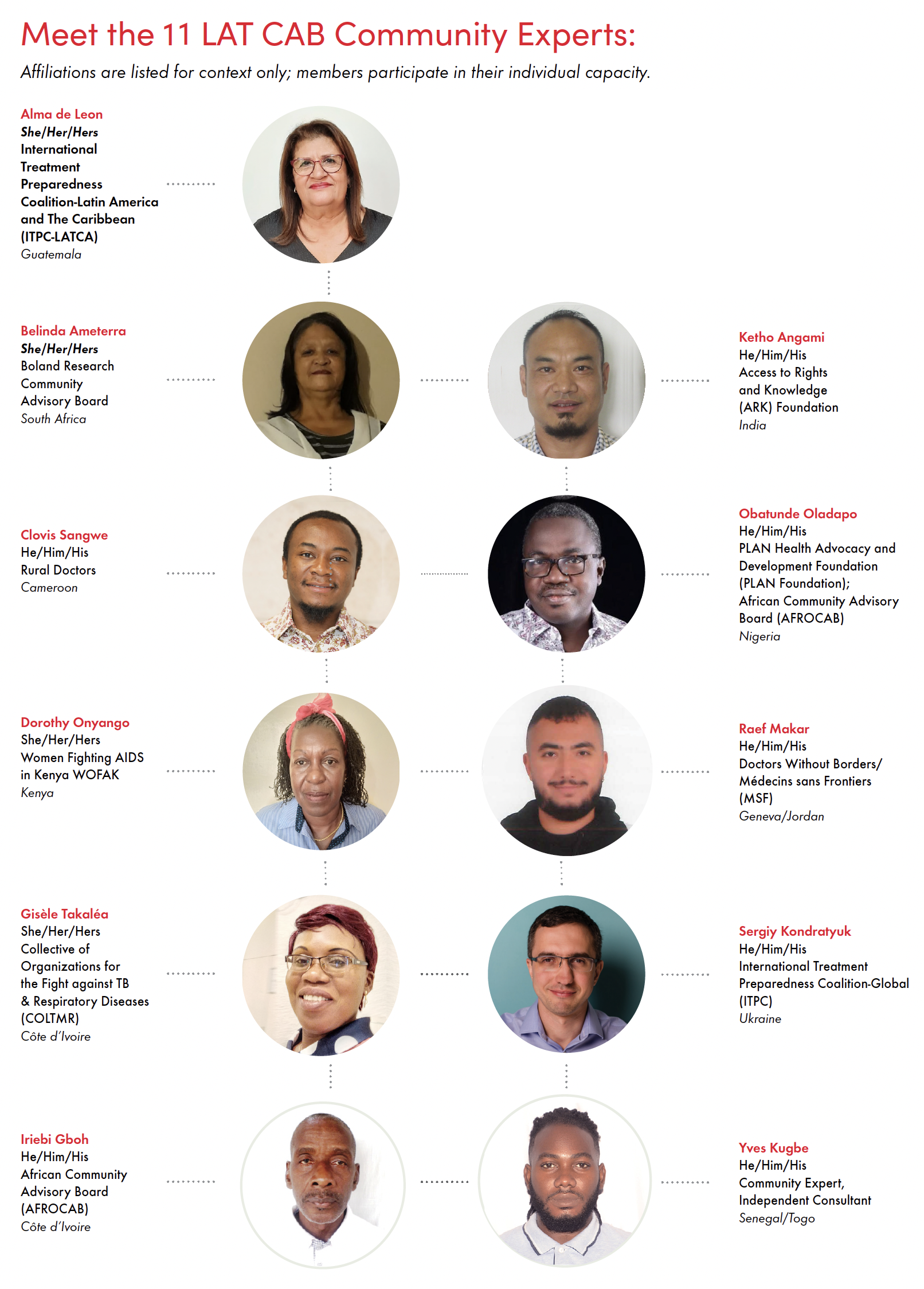By Bryn Gay, Joelle Dountio Ofimboudem, and Kenly Sikwese*
Meaningful and equitable community engagement is essential to ensuring that long-acting technologies (LATs) clinical research is conducted in ways that are safe, ethical, appropriate, and responsive to community priorities and needs.1 To advance the community engagement work, Treatment Action Group (TAG) and the African Community Advisory Board (AfroCAB) have partnered to coordinate and co-chair a new global, cross-disease Long-Acting Technologies Community Advisory Board (LAT CAB).
LAT CAB is a dedicated community body that will advance LAT research and uptake under the Unitaid-funded LONGEVITY project.2 This will develop long-acting technologies for malaria and tuberculosis (TB) prevention, and a cure for the hepatitis C virus (HCV). The LAT CAB meets with clinical researchers, developers, contract manufacturing organizations, and project partners to address issues related to the science, costs and pricing, and access plans across countries, particularly those of low- and middle-income. LAT CAB can strengthen capacity and leadership among affected communities and advise on the approaches used to introduce LAT generally—creating demand for the treatment. LAT CAB can develop research and development (R&D) recommendations to ensure LATs are acceptable and meet the needs of affected communities. These recommendations will inform national and global guidelines.
During LONGEVITY project, community experts will review the state of long-acting therapeutics and preventives research, facilitate community contributions in the design and review of research protocols, and create a platform to engage in the R&D process. Community experts will also advise on research questions, survey and trial design, price points, and access issues. LAT CAB, in consultation with external technical experts, will analyze and review materials at learning sessions, provide community perspectives, and bridge the gap among communities, clinical researchers, and pharmaceutical developers. This will strengthen research and scientific literacy among activists and affected communities.
LAT CAB recruitment occurred over six weeks in April to June 2021. Applicants from a high TB, HCV, HIV, and/or malaria setting, or familiar with access or health systems barriers in low- and middle-income countries, were encouraged. Three external, independent reviewers assessed 24 eligible candidates according to criteria based on knowledge across HIV, HCV, TB, and/or malaria (the infections for which Unitaid is supporting LAT R&D across several projects), technical skills, activism experience, engagement with civil society networks, and quality of application materials. The selection process also considered balanced representation from diverse geographic regions, gender identities, and affected communities, including but not limited to people who use and inject drugs, men who have sex with men, sex workers, people who are incarcerated, people who are migrants, or Indigenous populations. By the end of July 2021, a total of 12 members were confirmed for a four-year tenure (2021-2024). The first introductory and planning meetings to map learning needs took place in September 2021.
 Among the myriad priorities, LAT CAB will cover R&D issues from conceptualization to lab bench to bedside:
Among the myriad priorities, LAT CAB will cover R&D issues from conceptualization to lab bench to bedside:
- Basic epidemiology and current treatment landscapes of malaria, HCV, and TB;
- A review on how the LONGEVITY project addresses treatment and prevention gaps;
- Lessons from long-acting (pre-exposure prophylaxis) PrEP and antiretrovirals;
- Complementarity of LA malaria prophylaxis with other control measures, including the roll-out of the new malaria vaccine;
- Direct-acting antiviral treatment uptake, registration gaps, access/licensing challenges, and the role of long-acting glecaprevir/pibrentasvir (the lead candidate for an HCV LAT);
- Community perspectives on injectables for long-acting TB preventive therapy;
- The basics of clinical trials and clinical trial design;
- The basics of qualitative surveys;
- Diversity, equity, and inclusion in research;
- Considerations for inclusion of key populations, including pregnant individuals and children;
- Considerations for chronic diseases and comorbidities;
- Patent landscape and trends in long-acting technologies; and
- Strategies to incentivize generic manufacturers, bend cost curves for nanotechnology, increase production efficiencies, and address technology transfer.
*Kenly Sikwese is with the African Community Advisory Board
Endnotes
1 Lessem E. Nothing About Us Without Us: Community Engagement in Research to End the Epidemics. TAGline. [Internet]. 2019 May [cited 2021 September 6];26(1):2. https://www.treatmentactiongroup.org/resources/tagline/tagline-may-2019/.
2 Unitaid. Unitaid invests in long-acting medicines to simplify treatment and prevention for HIV, TB, malaria and HCV. [Press Release]. 2020 Jan. 31. https://unitaid.org/news-blog/unitaid-invests-in-long-acting-medicines-to-simplify-treatment-and-prevention-for-hiv-tb-malaria-and-hcv/#en.
